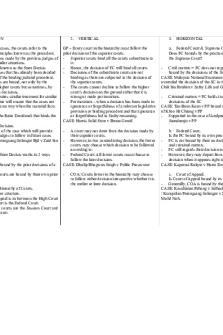The impact of accounting standards on hedging decisions PDF

| Title | The impact of accounting standards on hedging decisions |
|---|---|
| Author | Véronique Blum |
| Pages | 2 |
| File Size | 84.4 KB |
| File Type | |
| Total Downloads | 802 |
| Total Views | 913 |
Summary
The impact of accounting standards on hedging decisions Bernard Gumb Grenoble Ecole de Management B.P. 127 - 12, rue Pierre-Sémard F - 38003 Grenoble - Cedex 01 Tél. : (+33) 4 76 70 64 23 E-mail: [email protected] Philippe Dupuy Grenoble Ecole de Management B.P. 127 - 12, rue Pierre-Sémar...
Description
The impact of accounting standards on hedging decisions
Bernard Gumb Grenoble Ecole de Management B.P. 127 - 12, rue Pierre-Sémard F - 38003 Grenoble - Cedex 01 Tél. : (+33) 4 76 70 64 23 E-mail: [email protected] Philippe Dupuy Grenoble Ecole de Management B.P. 127 - 12, rue Pierre-Sémard F - 38003 Grenoble - Cedex 01 Tel.: +33 6 71 48 90 84 E-mail: [email protected] C. Richard Baker Adelphi University Garden City, New York 11530 USA Telephone: 1-516-877-4628 E-mail: [email protected] Véronique Blum Université Grenoble Alpes 2 place Doyen Gosse F- 38000 Grenoble, France Tel : +33 476 284 628 E-mail : [email protected]
The impact of accounting standards on hedging decisions Abstract Purpose: The purpose of this paper is to study the effects of financial accounting standards on the economic decisions of managers. The primary research question addressed in the paper is whether the hedging behavior of corporate treasurers in France has been affected by the issuance of International Accounting Standard No. 39 and International Financial Reporting Standard No. 9 dealing with financial instruments and hedging Design/methodology/approach: Forty-eight semi-structured interviews were conducted with French corporate treasurers. The interview instrument is included as an exhibit to this paper. The interviews were recorded and transcribed. In addition, three interviews were conducted with representatives of Big 4 audit firms who are experts in accounting for financial instruments. Our empirical findings are interpreted using a theoretical framework derived from Jean Baudrillard who argues that the "map" (accounting results) tends to define the "territory" (economic decision-making) in a period of “hyperreality” (when the underlying economic reality is confused). In other words, accounting standards, and the reported numbers that result from such standards, can influence the economic decisions of managers and not merely represent the outcome of economic decisions already taken. Findings: Corporate treasurers often make decisions based on earnings impact. This finding is similar to findings in prior literature regarding the effects of accounting standards on economic decisions taken by managers. A fear of increased earnings volatility is central to the treasurers' concerns. Also key is the complexity of the process for qualifying financial instruments for hedge accounting treatment. We also find that the behavior of corporate treasurers is neither stable nor homogeneous. The behavior appears to be the outcome of a collective learning process in which the corporate treasurer is only one actor. Originality/value: This paper is a qualitative research study conducted in an area of research where there have previously been only quantitative studies. Our access to a large number of French corporate treasurers is unique. Our study supports prior findings regarding the influence of accounting standards on managerial behavior, but with an added theoretical interpretation related to Baudrillard's arguments regarding the nature of the "map" and the "territory" in complex economic systems. Key words: corporate treasurers, IFRS, accounting standards, hedging, map, territory...
Similar Free PDFs

Hedging
- 5 Pages

Impact of humble leadership on
- 20 Pages

Notes on Judicial Decisions
- 2 Pages

Ch01-accounting-standards
- 14 Pages

AASB 107 - Accounting Standards
- 21 Pages
Popular Institutions
- Tinajero National High School - Annex
- Politeknik Caltex Riau
- Yokohama City University
- SGT University
- University of Al-Qadisiyah
- Divine Word College of Vigan
- Techniek College Rotterdam
- Universidade de Santiago
- Universiti Teknologi MARA Cawangan Johor Kampus Pasir Gudang
- Poltekkes Kemenkes Yogyakarta
- Baguio City National High School
- Colegio san marcos
- preparatoria uno
- Centro de Bachillerato Tecnológico Industrial y de Servicios No. 107
- Dalian Maritime University
- Quang Trung Secondary School
- Colegio Tecnológico en Informática
- Corporación Regional de Educación Superior
- Grupo CEDVA
- Dar Al Uloom University
- Centro de Estudios Preuniversitarios de la Universidad Nacional de Ingeniería
- 上智大学
- Aakash International School, Nuna Majara
- San Felipe Neri Catholic School
- Kang Chiao International School - New Taipei City
- Misamis Occidental National High School
- Institución Educativa Escuela Normal Juan Ladrilleros
- Kolehiyo ng Pantukan
- Batanes State College
- Instituto Continental
- Sekolah Menengah Kejuruan Kesehatan Kaltara (Tarakan)
- Colegio de La Inmaculada Concepcion - Cebu










